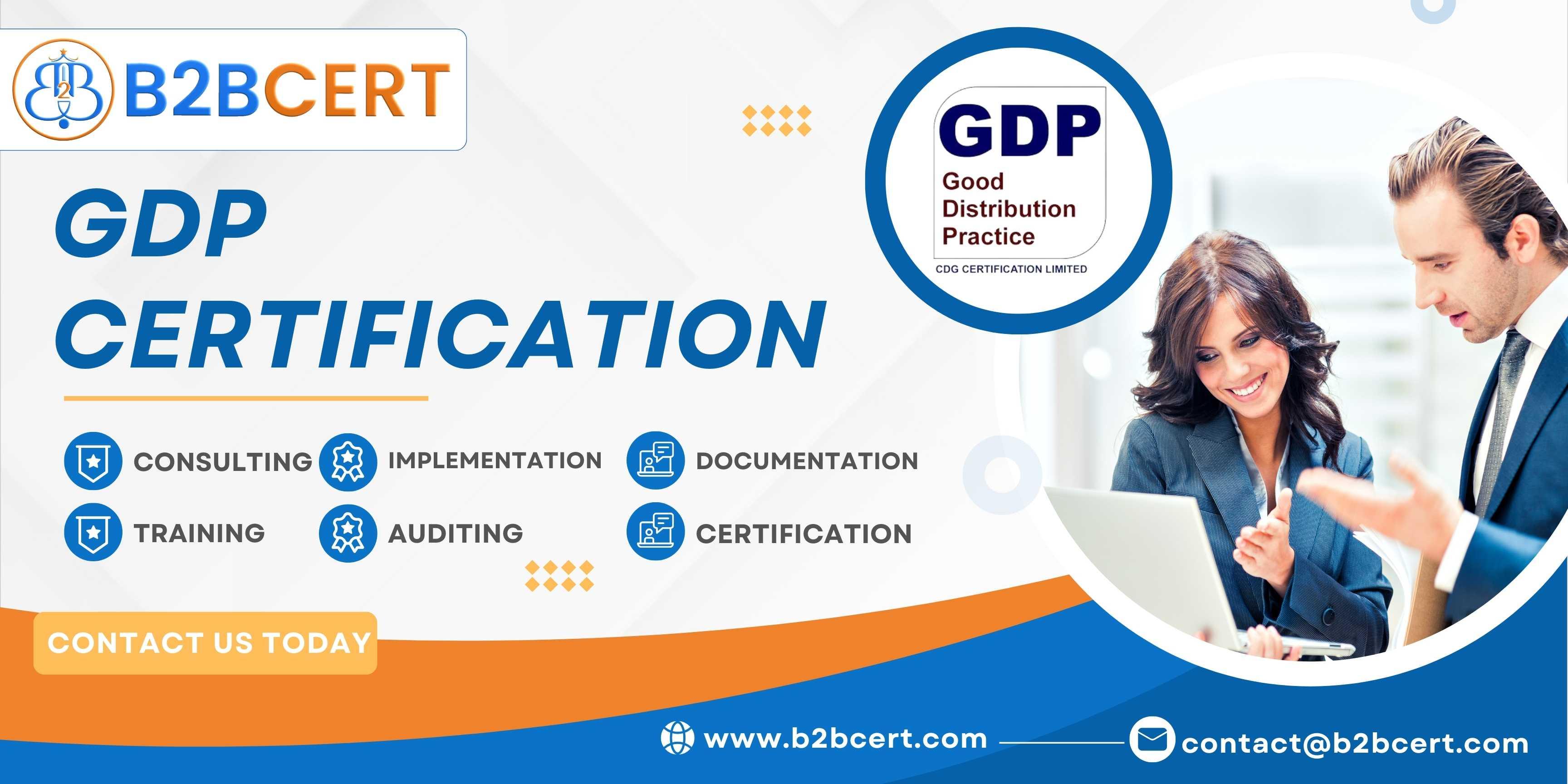Case Studies: Successful Implementation of GDP Certification in Leading Pharmaceutical Companies

In the highly regulated pharmaceutical industry, maintaining product integrity, safety, and quality throughout the supply chain is paramount. Good Distribution Practices (GDP) provide a globally recognized framework ensuring that pharmaceutical products are consistently stored, transported, and handled under proper conditions. The successful implementation of GDP Certification in Los Angeles has become a defining factor for companies striving to achieve regulatory compliance, operational excellence, and enhanced customer trust.
This article explores how pharmaceutical companies have benefited from adopting GDP standards, detailing their challenges, implementation strategies, and the measurable improvements realized post-certification.
Understanding GDP Certification in Los Angeles
GDP in Los Angeles ensures that the quality and integrity of pharmaceutical products are maintained from the manufacturer to the end-user. It governs every aspect of the distribution process—procurement, storage, transportation, and documentation—ensuring that medicines remain safe, effective, and traceable throughout their journey.
Organizations pursuing GDP Certification in Los Angeles are required to establish robust quality management systems, implement risk-based procedures, and ensure that staff are adequately trained in handling medicinal products. With the guidance of experienced GDP Consultants in Los Angeles, companies can align their operations with both local and international regulatory expectations, including WHO and EU GDP guidelines.
Pre-Certification Challenges Faced by Pharmaceutical Companies
Before achieving certification, many companies face critical challenges in maintaining distribution integrity. These challenges often include:
-
Inadequate Storage and Transportation Controls: Products exposed to temperature fluctuations risk losing potency and safety.
-
Lack of Documentation and Traceability: Without a strong record-keeping system, tracking product movement becomes difficult.
-
Regulatory Non-Compliance: Failing to meet GDP standards can result in penalties, recalls, or loss of distribution licenses.
-
Operational Inefficiencies: Poorly designed logistics systems increase costs and delay deliveries.
-
Concerns About GDP Cost in Los Angeles: Some companies hesitate to invest in certification, not realizing that the long-term savings and trust far outweigh the initial expenses.
Through proper planning, expert guidance, and structured audits, these challenges can be overcome, resulting in significant operational and reputational benefits.
Case Study 1: Strengthening Supply Chain Integrity
A mid-sized pharmaceutical distributor struggled with inconsistencies in temperature control during transport. With support from GDP Consultants in Los Angeles, the organization introduced temperature monitoring systems, implemented risk management procedures, and trained staff in GDP compliance.
Following a successful GDP Audit in Los Angeles, the company saw measurable improvements—reduced spoilage rates, fewer customer complaints, and enhanced regulatory confidence. Certification validated their commitment to safety and reliability, improving trust among healthcare providers and suppliers.
Case Study 2: Achieving Regulatory Compliance and Efficiency
Another pharmaceutical wholesaler faced difficulties with documentation and traceability during regulatory inspections. By aligning with GDP Certification in Los Angeles, the company developed a digital tracking system, standardized operating procedures, and clear documentation protocols.
After completing the GDP Audit in Los Angeles, the organization not only achieved compliance but also streamlined its internal processes. Audit readiness became an ongoing practice, ensuring consistent quality control and reduced administrative burden. The overall outcome included faster order processing and lower operational risks.
Case Study 3: Enhancing Customer Confidence and Market Expansion
A large-scale pharmaceutical exporter sought GDP Certification in Los Angeles to improve credibility in global markets. With guidance from GDP Consultants in Los Angeles, they implemented quality assurance systems, improved supplier evaluation processes, and established a culture of continuous improvement.
Post-certification, the company reported significant benefits—expanded market reach, increased client satisfaction, and recognition from regulatory authorities. The certification served as a powerful differentiator, helping the company win new contracts and partnerships with confidence.
Benefits of GDP Certification in Los Angeles
The experiences of these organizations highlight the transformative value of GDP certification. The following benefits are commonly observed across certified companies:
-
Regulatory Compliance: Alignment with international standards ensures readiness for inspections and legal approvals.
-
Product Integrity: Continuous monitoring of storage and transportation preserves the safety and efficacy of medicines.
-
Operational Efficiency: Streamlined processes reduce wastage, errors, and costs.
-
Enhanced Customer Trust: Certification reinforces credibility among clients, healthcare professionals, and regulators.
-
Improved Risk Management: Proactive identification and control of risks safeguard supply chain continuity.
-
Global Market Access: Compliance with GDP standards enables companies to expand into international markets with ease.
While the GDP Cost in Los Angeles may vary depending on the organization’s size, operations, and readiness, the return on investment is significant—resulting in increased operational stability and market growth.
The Role of GDP Consultants and Auditors in Los Angeles
Achieving GDP certification is a structured process that requires expert guidance. GDP Consultants in Los Angeles assist organizations in conducting gap analyses, developing standard operating procedures (SOPs), training employees, and implementing monitoring systems. Their expertise helps companies prepare effectively for the GDP Audit in Los Angeles, ensuring all compliance requirements are met.
Auditors, on the other hand, assess every component of the distribution chain—facilities, documentation, personnel, and logistics—before granting certification. Their evaluation promotes continuous improvement, helping companies maintain high standards of product safety and quality.
Lessons from GDP Success Stories
From these case studies, several key takeaways emerge for pharmaceutical organizations considering certification:
-
Leadership Commitment is Crucial: Senior management must drive the quality culture for successful implementation.
-
Training Builds Long-Term Compliance: Regular staff education ensures adherence to GDP principles.
-
Technology Enhances Traceability: Digital systems improve record-keeping and logistics efficiency.
-
Continuous Improvement is Key: Periodic audits and reviews sustain compliance and operational performance.
Conclusion
The success stories of companies achieving GDP Certification in Los Angeles clearly demonstrate that certification is more than a compliance requirement—it is a strategic investment in quality, trust, and efficiency. By implementing robust distribution practices, organizations enhance product safety, minimize risks, and strengthen relationships with stakeholders across the supply chain.
With the support of GDP Consultants in Los Angeles and through regular GDP Audits in Los Angeles, companies can continuously improve their operations while maintaining full regulatory compliance. Though the GDP Cost in Los Angeles may seem like a consideration at first, the long-term benefits—enhanced reputation, improved efficiency, and market expansion—make it an essential step toward excellence in pharmaceutical distribution.
- Искусство
- История и факты
- Ремесла
- Танцы
- Напитки
- Фильмы
- Фитнесс
- Питание
- Игры
- Садоводство
- Здоровье
- Дом
- Литература
- Музыка
- Сеть
- Другое
- Вечеринка
- Религия
- Поход по магазинам
- Спорт
- Театр
- Здоровье



